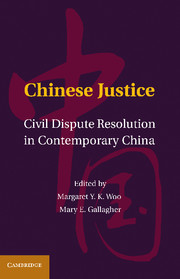Book contents
- Frontmatter
- Contents
- Tables and Figures
- Contributors
- Acknowledgments
- Abbreviations
- Glossary
- Introduction
- PART I LEGAL DEVELOPMENT AND INSTITUTIONAL TENSIONS
- 1 From Mediatory to Adjudicatory Justice: The Limits of Civil Justice Reform in China
- 2 Judicial Disciplinary Systems for Incorrectly Decided Cases: The Imperial Chinese Heritage Lives On
- 3 Legalizing the Local State: Administrative “Legality” at China's Grassroots
- 4 Economic Development and the Development of the Legal Profession in China
- PART II PU FA AND THE DISSEMINATION OF LAW IN THE CHINESE CONTEXT
- PART III LAW FROM THE BOTTOM UP
- Conclusion: Chinese Justice from the Bottom Up
- Index
- References
2 - Judicial Disciplinary Systems for Incorrectly Decided Cases: The Imperial Chinese Heritage Lives On
Published online by Cambridge University Press: 05 July 2011
- Frontmatter
- Contents
- Tables and Figures
- Contributors
- Acknowledgments
- Abbreviations
- Glossary
- Introduction
- PART I LEGAL DEVELOPMENT AND INSTITUTIONAL TENSIONS
- 1 From Mediatory to Adjudicatory Justice: The Limits of Civil Justice Reform in China
- 2 Judicial Disciplinary Systems for Incorrectly Decided Cases: The Imperial Chinese Heritage Lives On
- 3 Legalizing the Local State: Administrative “Legality” at China's Grassroots
- 4 Economic Development and the Development of the Legal Profession in China
- PART II PU FA AND THE DISSEMINATION OF LAW IN THE CHINESE CONTEXT
- PART III LAW FROM THE BOTTOM UP
- Conclusion: Chinese Justice from the Bottom Up
- Index
- References
Summary
INTRODUCTION
Local Chinese courts commonly use responsibility systems (mubiao guanli zeren zhi, zeren zhuijiu zhi) to evaluate and discipline judges. Judges receive sanctions under these systems for a wide range of behavior, such as illegal or unethical dealings with parties and lawyers, inappropriate courtroom behavior, and neglect of duty.
Many local court Chinese responsibility systems also discipline judges for simple legal error. Judges may face sanctions linked to the number of cases that are reversed on appeal simply because the interpretation of law made by a higher court differs from that of the original trial judge. Sanctions include monetary fines and negative notations in a judge's career file. Such practices violate Chinese Supreme People's Court (SPC) judicial directives specifically barring the use of responsibility systems to sanction judges for simple legal error. Local Chinese courts, however, have continued to promulgate such systems.
Court responsibility systems that discipline judges for simple legal error also create a perverse set of incentives for Chinese judges. To avoid appellate reversal, lower Chinese courts and judges rely on an ill-defined system of advisory requests (qingshi) to solicit the views of higher courts and judges on how to decide pending cases. As Chinese judges themselves note, excessive resort to qingshi practices has many negative effects. It undermines appellate review, because the court or judge that reviews the case on appeal may have responded to the initial qingshi request regarding how to decide the case in the first place.
- Type
- Chapter
- Information
- Chinese JusticeCivil Dispute Resolution in Contemporary China, pp. 58 - 90Publisher: Cambridge University PressPrint publication year: 2011
References
- 10
- Cited by



